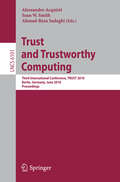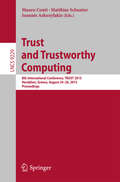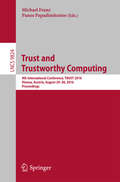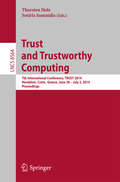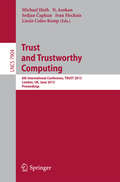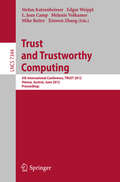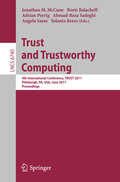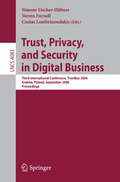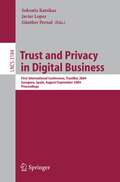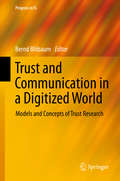- Table View
- List View
Trust Building and Boundary Spanning in Cross-Border Management (Routledge Studies in Trust Research)
by Michael W. ZhangThis edited book addresses two critical issues in international management: building trust and managing boundary spanning activities between international business partners. The duel-process of internationalization of multinational corporations (MNCs), through globalisation and regionalisation, has helped MNCs to increase their market expansion and improve the capabilities of innovation and learning. By creating various forms of international strategic alliances (ISAs), MNCs have become structurally more complex and geographically more dispersed. As a result, MNCs in general and ISAs in particular face the challenges of discerning blurred organisational boundaries, reconfiguring the control mechanisms, integrating diversified resources, and coordinating distributed activities in time and space. Research in organisation behaviour indicates that boundary spanners play critical yet unspecified roles and functions in managing cross-boundary relationships. A core boundary spanning function is to build trust relationships. When organisations engage in business transactions, members of the organisations are concerned with not only the outcomes of economic transactions but also the processes of social exchanges. Boundary spanners may succeed in building interpersonal trust in a partnership, nonetheless their effort may not lead to inter-partner trust without an effective implementation of the institutionalisation process. Whereas trustworthiness is the antecedent to trust providing the basis for trust to develop, distrust manifests itself as a separate and linked concept to trust. These dynamic features of trust, trustworthiness, and distrust are critically elaborated. Trust Building and Boundary Spanning in Cross-Border Management is dedicated to explicating these under-researched themes and contributing to the emerging streams of research in micro foundations and micro-structural approaches. It illustrates the latest research on the topic and will be of interest to both students at an advanced level, academics and reflective practitioners in the fields of organisational behaviour and theory, strategic management, international strategy and strategic alliances.
Trust beyond Borders: Immigration, the Welfare State, and Identity in Modern Societies (Contemporary Political And Social Issues)
by Markus M. CrepazWill immigration undermine the welfare state? Trust beyond Borders draws on public opinion data and case studies of Germany, Sweden, and the United States to document the influence of immigration and diversity on trust, reciprocity, and public support for welfare programs. Markus M. L. Crepaz demonstrates that we are, at least in some cases, capable of trusting beyond borders: of expressing faith in our fellow humans and extending help without regard for political classifications. In Europe, the welfare state developed under conditions of relative homogeneity that fostered high levels of trust among citizens, while in America anxiety about immigration and diversity predated the emergence of a social safety net. Looking at our new era of global migration, Crepaz traces the renewed debate about "us" versus "them" on both sides of the Atlantic and asks how it will affect the public commitment to social welfare. Drawing on the literatures on immigration, identity, social trust, and the welfare state, Trust beyond Borders presents a novel analysis of immigration's challenge to the welfare state and a persuasive exploration of the policies that may yet preserve it. "Crepaz contributes much to our knowledge about the link between immigration and social welfare, certainly one of the central issues in current national and international politics." ---Stuart Soroka, Associate Professor of Political Science and William Dawson Scholar, McGill University "Finally! A book that challenges the growing view that ethnic diversity is the enemy of social solidarity. It addresses an issue of intense debate in Western nations; it takes dead aim at the theoretical issues at the center of the controversy; it deploys an impressive array of empirical evidence; and its conclusions represent a powerful corrective to the current drift of opinion. Trust beyond Borders will rank among the very best books in the field." ---Keith Banting, Queen's Research Chair in Public Policy, Queen's University "Do mass immigration and ethnic diversity threaten popular support for the welfare state? Trust beyond Borders answers no. Marshaling an impressive array of comparative opinion data, Crepaz shows that countries with high levels of social trust and universal welfare state arrangements can avoid the development of the welfare chauvinism that typically accompanies diversity." ---Gary Freeman, Professor and Department Chair, Department of Government, University of Texas at Austin Markus M. L. Crepaz is Professor in the Department of International Affairs at the University of Georgia and Associate Director of the Center for the Study of Global Issues (GLOBIS).
Trust and Violence: An Essay on a Modern Relationship
by Jan Philipp ReemtsmaThe limiting of violence through state powers is one of the central projects of the modern age. Why then have recent centuries been so bloody? In Trust and Violence, acclaimed German intellectual and public figure Jan Philipp Reemtsma demonstrates that the aim of decreasing and deterring violence has gone hand in hand with the misleading idea that violence is abnormal and beyond comprehension. We would be far better off, Reemtsma argues, if we acknowledged the disturbing fact that violence is normal. At the same time, Reemtsma contends that violence cannot be fully understood without delving into the concept of trust. Not in violence, but in trust, rests the foundation of true power. Reemtsma makes his case with a wide-ranging history of ideas about violence, from ancient philosophy through Shakespeare and Schiller to Michel Foucault, and by considering specific cases of extreme violence from medieval torture to the Holocaust and beyond. In the midst of this gloomy account of human tendencies, Reemtsma shrewdly observes that even dictators have to sleep at night and cannot rely on violence alone to ensure their safety. These authoritarian leaders must trust others while, by means other than violence, they must convince others to trust them. The history of violence is therefore a history of the peculiar relationship between violence and trust, and a recognition of trust's crucial place in humanity. A broad and insightful book that touches on philosophy, sociology, and political theory, Trust and Violence sheds new, and at times disquieting, light on two integral aspects of our society.
Trust and Violence: An Essay on a Modern Relationship
by Jan Philipp ReemtsmaThe limiting of violence through state powers is one of the central projects of the modern age. Why then have recent centuries been so bloody? In Trust and Violence, acclaimed German intellectual and public figure Jan Philipp Reemtsma demonstrates that the aim of decreasing and deterring violence has gone hand in hand with the misleading idea that violence is abnormal and beyond comprehension. We would be far better off, Reemtsma argues, if we acknowledged the disturbing fact that violence is normal. At the same time, Reemtsma contends that violence cannot be fully understood without delving into the concept of trust. Not in violence, but in trust, rests the foundation of true power. Reemtsma makes his case with a wide-ranging history of ideas about violence, from ancient philosophy through Shakespeare and Schiller to Michel Foucault, and by considering specific cases of extreme violence from medieval torture to the Holocaust and beyond. In the midst of this gloomy account of human tendencies, Reemtsma shrewdly observes that even dictators have to sleep at night and cannot rely on violence alone to ensure their safety. These authoritarian leaders must trust others while, by means other than violence, they must convince others to trust them. The history of violence is therefore a history of the peculiar relationship between violence and trust, and a recognition of trust's crucial place in humanity. A broad and insightful book that touches on philosophy, sociology, and political theory, Trust and Violence sheds new, and at times disquieting, light on two integral aspects of our society.
Trust and Trustworthy Computing: Third International Conference, TRUST 2010, Berlin, Germany, June 21-23, 2010, Proceedings (Lecture Notes in Computer Science #6101)
by Alessandro Acquisti Sean W. Smith Ahmad-Reza SadeghiThis volume contains the proceedings of the Third International Conference on Trust and Trustworthy Computing (TRUST), held at the Ritz-Carlton hotel in Berlin, Germany, June 21–23, 2010. TRUST is a rapidly growing forum for research on the technical and soc- economic aspects of trustworthy infrastructures. TRUST provides an interdis- plinary forum for researchers, practitioners, and decision makers to explore new ideas and discuss experiences in building, designing, using, and understanding trustworthy computing systems. The third edition of TRUST welcomed manuscripts in two di?erent tracks: a Technical Strand and a Socio-economic Strand. We assembled an engaging program with 21 peer-reviewed technical papers and nine peer-reviewed soc- economic papers; eight keynotes from industry, academia, and government; and panel discussions on privacy and standards. In addition, this year, TRUST was co-located with four workshops: Trust in Cloud, Hardware Security, Emerging and Future Risks, and Anonymous Signatures. We would like to thank numerous individuals for their e?ort and contri- tion to the conference and for making TRUST 2010 possible: the Organizing Committee members—Nadine Palacios and Marcel Winandy—for their trem- dous help with all aspects of the organization;the Technicaland Socio-economic Program Committee members, whose names are listed on the following pages, together with the names of external reviewers who helped us in the process of selecting manuscripts to be included in the conference proceedings; the keynote and invited speakers; and the invited panel speakers.
Trust and Trustworthy Computing: 8th International Conference, TRUST 2015, Heraklion, Greece, August 24-26, 2015, Proceedings (Lecture Notes in Computer Science #9229)
by Mauro Conti Matthias Schunter Ioannis AskoxylakisThis book constitutes the refereed proceedings of the 8th International Conference on Trust and Trustworthy Computing, TRUST 2015, held in Heraklion, Crete, Greece, in August 2015.The 15 full papers and 3 short papers presented in this volume were carefully reviewed and selected from 42 submissions. They were organized in topical sections named: hardware-enhanced trusted execution; trust and users; trusted systems and services; trust and privacy; and building blocks for trust. There are 7 two-page abstracts of poster papers included in the back matter of the volume.
Trust and Trustworthy Computing: 9th International Conference, TRUST 2016, Vienna, Austria, August 29-30, 2016, Proceedings (Lecture Notes in Computer Science #9824)
by Michael Franz Panos PapadimitratosThis book constitutes the refereed proceedings of the 9th International Conference on Trust and Trustworthy Computing, TRUST 2016, held in Vienna, Austria, in August 2016. The 8 full papers presented in this volume were carefully reviewed and selected from 25 submissions. Topics discussed in this year's research contributions included topics such as anonymous and layered attestation, revocation, captchas, runtime integrity, trust networks, key migration, and PUFs. Topics discussed in this year's research contributions included topics such as anonymous and layered attestation, revocation, captchas, runtime integrity, trust networks, key migration, and PUFs.
Trust and Trustworthy Computing: 7th International Conference, TRUST 2014, Heraklion, Crete, Greece, June 30 -- July 2, 2014, Proceedings (Lecture Notes in Computer Science #8564)
by Thorsten Holz Sotiris IoannidisThis book constitutes the refereed proceedings of the 7th International Conference on Trust and Trustworthy Computing, TRUST 2014, held in Heraklion, Crete, Greece in June/July 2014. The 10 full papers and three short papers presented together with 9 poster abstracts were carefully reviewed and selected from 40 submissions. They are organized in topical sections such as TPM 2.0, trust in embedded and mobile systems; physical unclonable functions; trust in the web; trust and trustworthiness.
Trust and Trustworthy Computing: 6th International Conference, TRUST 2013, London, UK, June 17-19, 2013, Proceedings (Lecture Notes in Computer Science #7904)
by Michael Huth N. Asokan Srdjan Capkun Ivan Flechais Lizzie Coles-KempThis book constitutes the refereed proceedings of the 6th International Conference on Trust and Trustworthy Computing, TRUST 2013, held in London, UK, in June 2013. There is a technical and a socio-economic track. The full papers presented, 14 and 5 respectively, were carefully reviewed from 39 in the technical track and 14 in the socio-economic track. Also included are 5 abstracts describing ongoing research. On the technical track the papers deal with issues such as key management, hypervisor usage, information flow analysis, trust in network measurement, random number generators, case studies that evaluate trust-based methods in practice, simulation environments for trusted platform modules, trust in applications running on mobile devices, trust across platform. Papers on the socio-economic track investigated, how trust is managed and perceived in online environments, and how the disclosure of personal data is perceived; and some papers probed trust issues across generations of users and for groups with special needs.
Trust and Trustworthy Computing: 5th International Conference, TRUST 2012, Vienna, Austria, June 13-15, 2012, Proceedings (Lecture Notes in Computer Science #7344)
by Stefan Katzenbeisser Edgar Weippl L. Jean Camp Melanie Volkamer Mike Reiter Xinwen ZhangThis book constitutes the refereed proceedings of the 5th International Conference on Trust and Trustworthy Computing, TRUST 2012, held in Vienna, Austria, in June 2012. The 19 revised full papers presented were carefully reviewed and selected from 48 submissions. The papers are organized in two tracks: a technical track with topics ranging from trusted computing and mobile devices to applied cryptography and physically unclonable functions, and a socio-economic track focusing on the emerging field of usable security.
Trust and Trustworthy Computing: 4th International Conference, TRUST 2011, Pittsburgh, PA, USA, June 22-24, 2011, Proceedings (Lecture Notes in Computer Science #6740)
by Jonathan McCune Boris Balacheff Adrian Perrig Ahmad-Reza Sadeghi Angela Sasse Yolanta BeresThis book constitutes the refereed proceedings of the 4th International Conference on Trust and Trustworthy Computing, TRUST 2011, held in Pittsburgh, PA, USA in June 2011.The 23 revised full papers presented were carefully reviewed and selected for inclusion in the book. The papers are organized in technical sessions on cloud and virtualization, physically unclonable functions, mobile device security, socio-economic aspects of trust, hardware trust, access control, privacy, trust aspects of routing, and cryptophysical protocols.
Trust and Trustworthiness across Cultures: Implications for Societies and Workplaces (Springer Series in Emerging Cultural Perspectives in Work, Organizational, and Personnel Studies)
by Catherine T. Kwantes Ben C. H. KuoThis book investigates trust in seven different cultural contexts, exploring how societal culture can influence our expectations regarding what may be considered trustworthy within a cultural context. Although the definition of trustworthiness is clear, how it is operationalized and applied in various cultural contexts can vary greatly. While certain components of trustworthiness may be universal, what a given society expects from individuals, and the extent to which they fulfill those expectations, plays a role in whether or not those individuals may be trusted. Each chapter discusses literature related to trust and trustworthiness within a specific cultural context, addresses both etic and emic aspects of decisions to trust another, and provides practical implications, with a focus on how trustworthiness can be seen in organizational contexts. With contributions from international scholars and a diverse range of cross-cultural perspectives, this unique volume will be of interest to work psychologists, HR and management professionals, and researchers in organizational behavior.
Trust and Transparency in an Age of Surveillance (Routledge Studies in Surveillance)
by Lora Anne ViolaInvestigating the theoretical and empirical relationships between transparency and trust in the context of surveillance, this volume argues that neither transparency nor trust provides a simple and self-evident path for mitigating the negative political and social consequences of state surveillance practices. Dominant in both the scholarly literature and public debate is the conviction that transparency can promote better-informed decisions, provide greater oversight, and restore trust damaged by the secrecy of surveillance. The contributions to this volume challenge this conventional wisdom by considering how relations of trust and policies of transparency are modulated by underlying power asymmetries, sociohistorical legacies, economic structures, and institutional constraints. They study trust and transparency as embedded in specific sociopolitical contexts to show how, under certain conditions, transparency can become a tool of social control that erodes trust, while mistrust—rather than trust—can sometimes offer the most promising approach to safeguarding rights and freedom in an age of surveillance. The first book addressing the interrelationship of trust, transparency, and surveillance practices, this volume will be of interest to scholars and students of surveillance studies as well as appeal to an interdisciplinary audience given the contributions from political science, sociology, philosophy, law, and civil society.
Trust and Transparency in an Age of Surveillance (Routledge Studies in Surveillance)
by Lora Anne Viola Pawe 322 LaidlerInvestigating the theoretical and empirical relationships between transparency and trust in the context of surveillance, this volume argues that neither transparency nor trust provides a simple and self-evident path for mitigating the negative political and social consequences of state surveillance practices. Dominant in both the scholarly literature and public debate is the conviction that transparency can promote better-informed decisions, provide greater oversight, and restore trust damaged by the secrecy of surveillance. The contributions to this volume challenge this conventional wisdom by considering how relations of trust and policies of transparency are modulated by underlying power asymmetries, sociohistorical legacies, economic structures, and institutional constraints. They study trust and transparency as embedded in specific sociopolitical contexts to show how, under certain conditions, transparency can become a tool of social control that erodes trust, while mistrust—rather than trust—can sometimes offer the most promising approach to safeguarding rights and freedom in an age of surveillance. The first book addressing the interrelationship of trust, transparency, and surveillance practices, this volume will be of interest to scholars and students of surveillance studies as well as appeal to an interdisciplinary audience given the contributions from political science, sociology, philosophy, law, and civil society.
Trust and the Health of Organizations (Clinical Sociology: Research and Practice)
by John G. BruhnLeaders are usually held responsible for the trust, health and success of an organization, but it is the culture of organizations that provides the true foundation for these important factors. The leader's personality and skills influence how a trustful environment and working relationship is created, but the organization has a culture, tradition and experience of its own which influences the leader's success. The level of trust in an organization's culture will ultimately determine whether or not it is trustful, healthy and successful.Based on the interview of current and former chief executive officers from profit and non profit organizations to record their experiences in creating trust in their environment and their perceptions of the health of their organizations. The collected data reveals: - The qualities of a "trusted" leader; - How they created trust or; - How trust was destroyed in organizations; - How leaders worked in distrustful environments; - How to create a more healthy organization. This timely work will be of interest to organizations and occupational sociologists, human resource workers, social psychologists, and students of management courses.
Trust and School Life: The Role of Trust for Learning, Teaching, Leading, and Bridging
by Dimitri Van Maele Patrick B. Forsyth Mieke Van HoutteThis book samples recent and emerging trust research in education including an array of conceptual approaches, measurement innovations, and explored determinants and outcomes of trust. The collection of pathways explores the phenomenon of trust and establishes the significance of trust relationships in school life. It emboldens the claim that trust merits continued attention of both scholars and practitioners because of the role it plays in the production of equity and excellence. Divided into four parts, the book explores trust under the rubrics of learning, teaching, leading and bridging.The book proposes a variety of directions for future research. These include the simultaneous investigation of trust from the prospectives of various trusters, and at both the individual and group levels, longitudinal research designs, and an elaboration of methods.
Trust and Rationality: An Integrative Framework for Trust Research (Forschung und Entwicklung in der Analytischen Soziologie)
by Stephan Alexander RompfCombining economic, social-psychological and sociological approaches to trust, this book provides a general theoretical framework to causally explain conditional and unconditional trust; it also presents an experimental test of the corresponding integrative model and its predictions. Broadly, it aims at advancing a cognitive turn in trust research by highlighting the importance of (1) an actor´s context-dependent definition of the situation and (2) the flexible and dynamic degree of rationality involved. In essence, trust is as “multi-faceted” as there are cognitive routes that take us to the choice of a trusting act. Therefore, variable rationality has to be incorporated as an orthogonal dimension to the typological space of trust. The theory presents an analytically tractable model; the empirical test combines trust games, high- and low-incentive conditions, framing manipulations, and psychometric measurements, and is complemented by decision-time analyses.
Trust and Privacy in Digital Business: Third International Conference, TrustBus 2006, Krakow, Poland, September 4-8, 2006, Proceedings (Lecture Notes in Computer Science #4083)
by Simone Fischer-Hübner Steven Furnell Costas LambrinoudakisThis book constitutes the refereed proceedings of the Third International Conference on Trust and Privacy in Digital Business, TrustBus 2006, held in conjunction with DEXA 2006. The book presents 24 carefully reviewed, revised full papers, organized in topical sections on privacy and identity management, security and risk management, security requirements and development, privacy enhancing technologies and privacy management, access control models, trust and reputation, security protocols and more.
Trust and Privacy in Digital Business: First International Conference, TrustBus 2004, Zaragoza, Spain, August 30-September 1, 2004, Proceedings (Lecture Notes in Computer Science #3184)
by Sokratis Katsikas Günther PernulSincerely welcome to proceedings of the 1st International Conference on Trust and Privacy in Digital Business, Zaragoza, Spain, held from August 30th to September 1st, 2004. This conference was an outgrowth of the two successful TrustBus inter- tional workshops, held in 2002 and 2003 in conjunction with the DEXA conferences in Aix-en-Provence and in Prague. Being the first of a planned series of successful conferences it was our goal that this event would initiate a forum to bring together researchers from academia and commercial developers from industry to discuss the state of the art of technology for establishing trust and privacy in digital business. We thank you all the attendees for coming to Zaragoza to participate and debate the new emerging advances in this area. The conference program consisted of one invited talk and nine regular technical papers sessions. The invited talk and keynote speech was delivered by Ahmed Patel from the Computer Networks and Distributed Systems Research Group, University College Dublin, Ireland on “Developing Secure, Trusted and Auditable Services for E-Business: An Autonomic Computing Approach”. A paper covering his talk is also contained in this book. The regular paper sessions covered a broad range of topics, from access control - sues to electronic voting, from trust and protocols to digital rights management. The conference attracted close to 100 submissions of which the program committee - cepted 29 papers for presentation and inclusion in the conference proceedings.
Trust and Power
by Niklas LuhmannIn this important book, Niklas Luhmann uses his powers as an analyst of the social system to examine two of the most important concepts which hold that system together and allow it to evolve: trust and power. He criticises those theoretical accounts whose roots lie in what he refers to as ideologies – accounts which use implicit beliefs in particular conceptions of human nature to explain and predict social action in a one-dimensional way. Theories of rational choice and moralistic explanations are taken to task, as are the theories of both Marx and Habermas. Luhmann's unique scientific sociology underpins every page and enables him to highlight the potential shortcomings of these narrative approaches. Underlying this approach is the idea that ideologically-based social theory, whether critical or conservative, is unable to do justice to the complexities existing within the parameters of social systems, individuals, and the interactions between them. He aims to show instead how only a painstaking systems analysis can capture these intricacies. Although written over 40 years ago, Luhmann's complex vision of the operations of trust and power provides a wealth of insights of considerable value to scholars and students grappling with contemporary social and economic problems. The editors' introduction to this new edition and the significant revisions they have made to the translation will help to reveal the richness and clarity of this vision and its relevance to the ways that trust and power operate in today's society.
Trust and Power
by Niklas LuhmannIn this important book, Niklas Luhmann uses his powers as an analyst of the social system to examine two of the most important concepts which hold that system together and allow it to evolve: trust and power. He criticises those theoretical accounts whose roots lie in what he refers to as ideologies – accounts which use implicit beliefs in particular conceptions of human nature to explain and predict social action in a one-dimensional way. Theories of rational choice and moralistic explanations are taken to task, as are the theories of both Marx and Habermas. Luhmann's unique scientific sociology underpins every page and enables him to highlight the potential shortcomings of these narrative approaches. Underlying this approach is the idea that ideologically-based social theory, whether critical or conservative, is unable to do justice to the complexities existing within the parameters of social systems, individuals, and the interactions between them. He aims to show instead how only a painstaking systems analysis can capture these intricacies. Although written over 40 years ago, Luhmann's complex vision of the operations of trust and power provides a wealth of insights of considerable value to scholars and students grappling with contemporary social and economic problems. The editors' introduction to this new edition and the significant revisions they have made to the translation will help to reveal the richness and clarity of this vision and its relevance to the ways that trust and power operate in today's society.
Trust and Communication in a Digitized World: Models and Concepts of Trust Research (Progress in IS #0)
by Bernd BlöbaumThis book explores models and concepts of trust in a digitized world. Trust is a core concept that comes into play in multiple social and economic relations of our modern life. The book provides insights into the current state of research while presenting the viewpoints of a variety of disciplines such as communication studies, information systems, educational and organizational psychology, sports psychology and economics. Focusing on an investigation of how the Internet is changing the relationship between trust and communication, and the impact this change has on trust research, this volume facilitates a greater understanding of these topics, thus enabling their employment in social relations.
Trust and Communication: Findings and Implications of Trust Research
by Bernd BlöbaumTrust is a fundamental concept in modern society. This book provides current findings of trust research from various disciplines: communication studies, information systems, educational and organizational psychology, sports psychology and economics. The volume analyses how trust relationships have changed and are still changing under the influence of digitalization. In addition to presenting the current state of research, the implications for trust relationships in the digital world are examined. The book brings together empirical findings with the implications for media, business, sports and science. It is of value to interdisciplinary researchers and graduate students.
Trust and Civil Society
by F. Tonkiss A. Passey N. Fenton L. HemsTrust and Civil Society offers an original and accessible analysis of the meaning of 'trust' in a range of critical contexts: voluntary organizations, faith associations, the economy, the state and welfare, environmental issues and charity. Balancing theory with grounded analysis, and drawing on interdisciplinary and international perspectives, the book makes an important contribution to contemporary debates. It will be of interest to academics, students, researchers and practitioners in a range of fields.
Trust: A Philosophical Approach (Studies in Applied Philosophy, Epistemology and Rational Ethics #54)
by Adriano FabrisThis book presents cutting-edge concepts on the question of trust. Written by leading experts, it investigates a paradoxical feature of contemporary society: while information and communication technologies, on the one hand, and scientific discourses, on the other, can promote more informed participation in public and democratic life, they have also led to a dramatic decline in our communicative and cooperative skills. The book analyzes the notion of trust from an interdisciplinary perspective by combining the normative (continental) and empirical (Anglo-American) approaches and by considering the political, epistemological, and historical transformations in the interpersonal relationships sparked by new technologies. Using trust as a model, it then investigates and clarifies the new types of participation that are made possible by scientific and technological advances.



